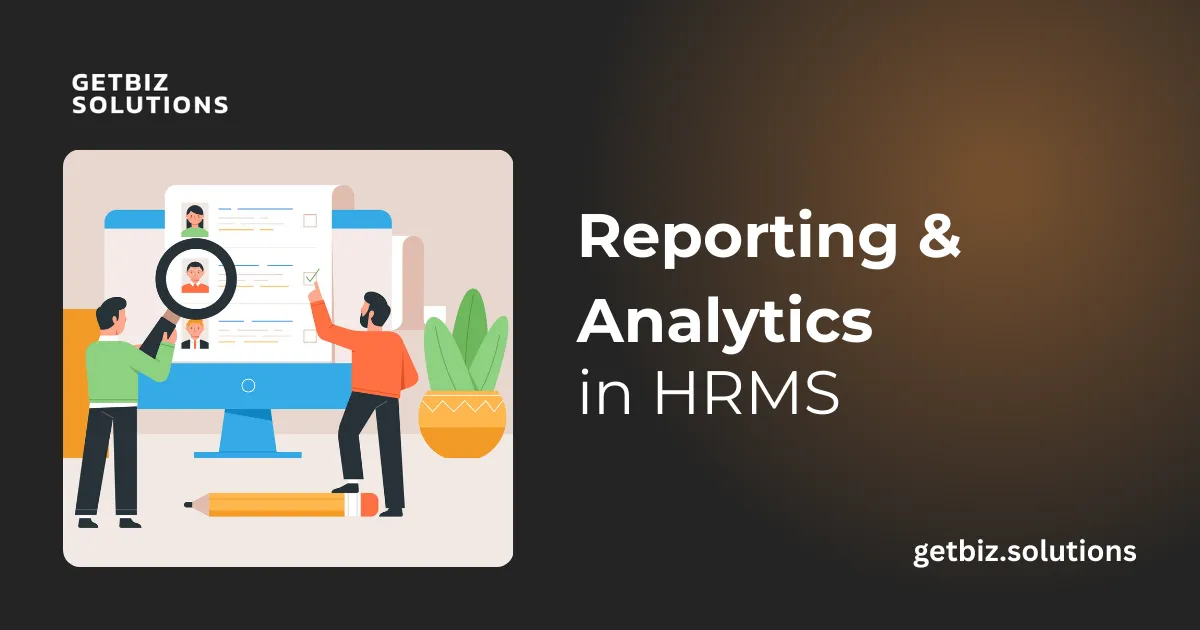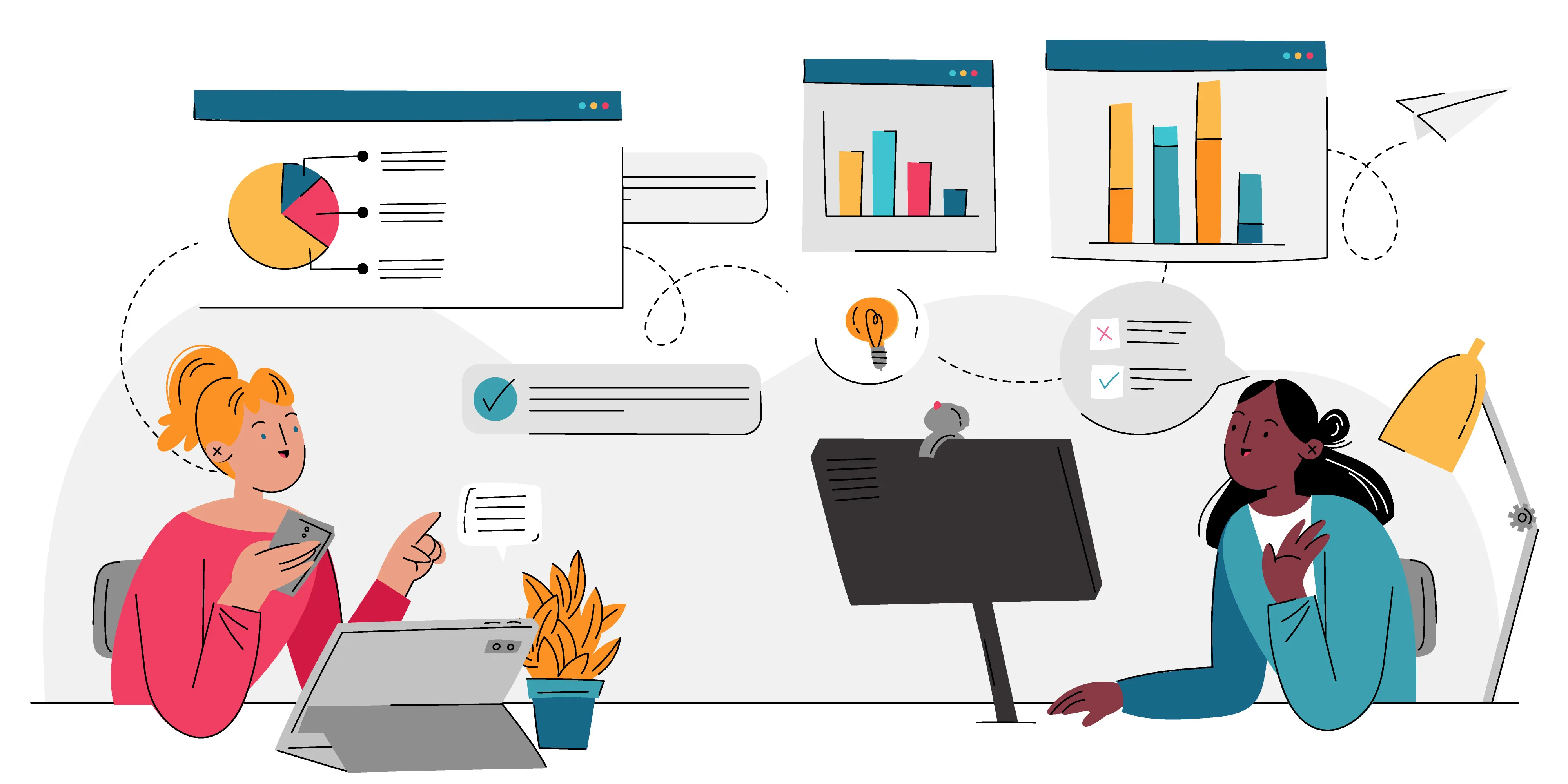Reporting & Analytics in HRMS Why It Matters for Business Decisions

Overview
- Quick Summary
- What Is HR Reporting and Analytics?
- Real-Time vs Historical Reporting
- Use Case Examples: How Businesses Leverage Reporting & Analytics
- Integration Capabilities with Other Systems
- Department-Level Insights
- AI-Powered HR Insights
- Tips for Effective Reporting & Analytics
- Why Choose GetBiz for Reporting & Analytics?
- Why Reporting & Analytics Matter More Than Ever
- Key Reports You Should Be Monitoring
- Real-World Examples of HR Analytics in Action
- Types of HR Analytics: Descriptive, Diagnostic, Predictive & Prescriptive
- Visual Dashboards: See More at a Glance
- Key Metrics to Include in Your HR Dashboard
- HR Reporting Best Practices
- Final Thoughts
Quick Summary
HR departments are no longer just administrative hubs—they’re strategic partners. And strategy needs data.
Modern HRMS reporting and analytics go beyond basic leave reports or attendance logs. They provide actionable insights into everything from hiring trends and workforce productivity to attrition risks and compliance gaps.
With GetBiz HRMS, reporting isn’t just informative—it’s transformative.
What Is HR Reporting and Analytics?
HR reporting refers to tracking and presenting data on various human resource activities such as attendance, recruitment, payroll, training, and performance.
HR analytics, on the other hand, dives deeper—identifying patterns, predicting outcomes, and supporting data-driven decisions.
Together, these tools empower HR leaders to:
- Improve workforce planning
- Enhance employee engagement
- Align HR goals with business KPIs
- Cut down inefficiencies and costs
Real-Time vs Historical Reporting
Modern HR decisions rely on both real-time data and historical analysis. GetBiz HRMS supports:
- Real-Time Dashboards: Instantly reflect changes in attendance, payroll, or headcount.
- Historical Trends: Identify patterns like seasonal hiring needs or attrition over years.
- Actionable Alerts: Get notified when KPIs exceed thresholds—such as overtime limits or leave usage.
This combination ensures both agility and strategic depth in HR planning.
Use Case Examples: How Businesses Leverage Reporting & Analytics
-
Employee Productivity Tracking
Monitoring task completion rates and attendance helps identify bottlenecks and plan workload distribution. -
Attrition Analysis
Deep dive into turnover data by department or role to improve retention strategies. -
Payroll Accuracy Audits
Automated reports flag inconsistencies in pay runs, helping avoid costly errors and compliance issues. -
Training Impact Assessment
Measure the effectiveness of training programs by correlating employee performance metrics before and after sessions.
Integration Capabilities with Other Systems
GetBiz Reporting seamlessly integrates with:
- Payroll systems for synchronized salary processing.
- Attendance devices to ensure accurate time tracking.
- Recruitment platforms for funnel analytics.
- Employee engagement tools to correlate sentiment scores with performance reports.
This unified data ecosystem ensures no silos, giving you a 360-degree HR view.
Department-Level Insights
Not all departments are the same — HR analytics respects that by offering customized dashboards:
| Department | Key Metrics Tracked |
|---|---|
| Sales | Commission reports, target achievements, overtime hours |
| Manufacturing | Shift adherence, safety incident rates |
| Customer Service | Call handling times, customer satisfaction scores |
| R&D | Project timelines, innovation output metrics |
Tailored analytics help managers focus on what matters most in their area.
AI-Powered HR Insights
The future of HR reporting lies in Artificial Intelligence. GetBiz leverages AI to:
- Predict turnover risks by analyzing engagement, attendance, and performance data.
- Recommend personalized learning paths based on skill gaps highlighted in reports.
- Automate anomaly detection in payroll and attendance for proactive corrections.
- Provide sentiment analysis on employee feedback and surveys.
This means HR teams can move from reactive troubleshooting to proactive workforce planning.
Tips for Effective Reporting & Analytics
- Define your KPIs clearly. Know what success looks like for your business.
- Regularly clean and validate your data to maintain report accuracy.
- Use visual dashboards to make complex data easy to digest.
- Automate routine reports so HR can focus on insights rather than data gathering.
- Encourage data literacy across your teams so everyone benefits from analytics.
- Protect employee privacy by enforcing role-based data access.

Why Choose GetBiz for Reporting & Analytics?
GetBiz is designed for Indian SMEs and enterprises with:
- User-friendly dashboards accessible on any device.
- Extensive customizable report templates.
- Automated report scheduling and email delivery.
- Compliance-ready analytics tailored for Indian labor laws.
- Dedicated support to help you unlock the full potential of your data.
Why Reporting & Analytics Matter More Than Ever
Without real-time data, decisions are based on assumptions. That’s a dangerous game in fast-moving business environments.
📊 “What gets measured gets managed.” — Peter Drucker
Benefits of HRMS Reporting
- Real-time decision-making
- Forecasting trends in hiring, attrition, and productivity
- Automated compliance tracking and audits
- Improved transparency with leadership and stakeholders
- Smart alerts to HR risks before they escalate
Key Reports You Should Be Monitoring
| Report | Purpose |
|---|---|
| Attendance Summary | Track punctuality, absenteeism, and shift trends |
| Leave Utilization | Monitor time-off patterns and leave liabilities |
| Payroll Register | Verify salary components, deductions, and payouts |
| Attrition Report | Identify high-turnover departments and causes |
| Hiring Funnel | Analyze recruitment stages and bottlenecks |
| Training ROI | Evaluate outcomes of employee learning programs |
| Performance Trends | Map individual/team growth over review cycles |
Real-World Examples of HR Analytics in Action
Reducing Attrition
One company used GetBiz to identify that most resignations happened in the first 6 months. With onboarding tweaks and early engagement strategies, they reduced attrition by 22%.
Improving Attendance
Analytics revealed Mondays and Fridays had the most absenteeism. After adjusting shift policies and team planning, productivity improved by 15%.
Optimizing Payroll
Payroll analytics flagged multiple salary mismatches linked to manual leave entries. With automated syncing, errors dropped by 95%.
Types of HR Analytics: Descriptive, Diagnostic, Predictive & Prescriptive
| Type | Description | Example Use |
|---|---|---|
| Descriptive | What happened? | Monthly attrition report |
| Diagnostic | Why did it happen? | Resignation reasons by department |
| Predictive | What will happen? | Forecasting staff shortages |
| Prescriptive | What should be done? | Recommended hiring pace |
Visual Dashboards: See More at a Glance
A great HRMS should let you:
- Track KPIs in real-time
- Customize views by role or department
- Exports data for reports or meetings
- Set alerts for anomalies (e.g. unplanned absenteeism)
GetBiz HRMS offers dashboards for:
- HR overview
- Department-wise insights
- Finance & compliance
- Leadership decision-making
Key Metrics to Include in Your HR Dashboard
- Absenteeism Rate
- Cost per Hire
- Employee Turnover
- Average Time to Fill
- Training Completion Rate
- Engagement Scores
- Salary vs Revenue per Employee
HR Reporting Best Practices
Automate report generation
Use visualizations (charts, graphs, heat maps)
Compare across periods (month-on-month, YoY)
Drill down by department or location
Share securely with stakeholders
Link metrics to business goals
Frequently Asked Questions
Can GetBiz HRMS generate custom reports?
Is analytics only useful for large enterprises?
Can I view real-time data in my reports?
Are the dashboards interactive and visual?
Can I automate report generation and delivery?
Does the system provide predictive analytics?
How secure is the data used in HR reports?
Can reports be filtered by department or location?
Can I link HR metrics to business KPIs?
Is it possible to export charts and visualizations for presentations?
Final Thoughts
HR reporting isn’t just a back-office task anymore—it’s a strategic lever.
With the right analytics, you can:
- Spot problems before they snowball
- Make hiring, retention, and payroll smarter
- Build a future-ready, data-driven HR culture
Let your numbers guide your next move—with GetBiz Reporting & Analytics.


